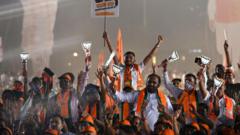Prime Minister Modi's party is poised to reclaim power in Maharashtra, while the opposition rises in Jharkhand amid fiscal concerns for new government promises.
Maharashtra Election Results Foreshadow BJP Dominance and Political Turmoil

Maharashtra Election Results Foreshadow BJP Dominance and Political Turmoil
In a significant turn, the BJP solidifies its majority in Maharashtra amidst political upheaval in Jharkhand.
In a remarkable electoral performance, Prime Minister Narendra Modi's Bharatiya Janata Party (BJP) is set to regain control in Maharashtra, India’s wealthiest state. Initial trends indicate that the BJP, along with its allies, is leading in nearly 220 of the 288 legislative seats, easily surpassing the threshold required to form a government. With Mumbai at its core, Maharashtra serves not only as a financial powerhouse but also as a critical political battleground in the country.
This election marks the first major regional contest in Maharashtra since the parliamentary elections earlier this year, wherein Modi secured a historic third term but fell short of an outright majority, necessitating alliances with regional factions. The BJP, now governing alongside splinter groups from the Shiv Sena and National Congress Party (NCP), has seen this resurgence as crucial, especially following setbacks in the previous parliamentary elections where opposition parties captured a significant share of seats.
BJP spokesperson Pravin Darekar expressed astonishment at the overwhelming victory, indicating strong voter support. The party’s retention of power in Maharashtra, along with recent wins in Haryana, could signal a rejuvenation of its standing against rising opposition threats.
As the BJP intensified its campaign with a number of welfare initiatives targeting farmers—vital in the state known for its agricultural output—the opposition mirrored these commitments with promises of debt waivers for farmers and financial support for vulnerable populations. However, critics warn that this competitive promise-making could plunge the incoming government into a serious fiscal deficit, potentially igniting public discontent if unfulfilled.
Meanwhile, political tensions are mounting in Jharkhand, where the BJP faces a potential defeat against the Congress and its allies, following a turbulent few months marked by the arrest of Chief Minister Hemant Soren on corruption allegations—a charge he denies. This political landscape sets the stage for an interesting dynamic, especially as both regions witnessed rapid party-switching and fluctuating allegiances in the lead-up to these elections.
In Jharkhand, where tribal communities represent a significant yet marginalized demographic, the opposition has also been active in making welfare promises, seeking to capitalize on Soren's political capitalize sympathy. This juxtaposition of fortunes between Maharashtra and Jharkhand serves as a telling narrative of India’s current electoral landscape, where the dance of power remains complex and fluid.






















